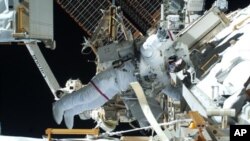The Obama administration has issued a new national space policy for the United States that emphasizes exploration, international cooperation, environmental monitoring and fostering a robust U.S. space industry.
Obama administration officials say the new policy will retain America's leadership in space, while recognizing that more nations are actively involved in humanity's quest to explore the heavens.
The National Security Council's Director for Defense Policy Barry Pavel spoke with reporters via teleconference.
"Certainly over the last 50 years, America has led the world in space exploration. Our achievements have led to incredible advances that have improved our lives and transformed our economy and that of the globe," Pavel said. "And when the space age began, its opportunities were limited to only a handful of countries. But now with the growth of the global economy, there are an ever-increasing number of nations and organizations using space or operating in space."
The new U.S. policy recognizes the right of all nations to access and explore space for peaceful purposes, but retains America's prerogative to use space in support of national security. It stipulates that the United States will expand international cooperation in space activities and pursue international agreements to encourage responsible space actions and boost transparency of space operations.
"If there is one really broad theme, it is international cooperation, which is woven throughout the new policy. And it is our foundational emphasis for achieving all of our goals in space," said Pavel.
The policy envisions a new age of human and robotic exploration of the solar system, including missions to Mars and beyond. It also extends the U.S. commitment to the International Space Station from 2015 to 2020. It recognizes the importance of the space industry to maintaining a strong and competitive U.S. industrial base and it seeks to encourage public-private partnerships for space ventures.
At a time of mounting ecological challenges, the policy stresses the contribution America's space program can make to environmental protection.
Jim Kohlenberger of the White House's Office of Science and Technology Policy says the space program will allow the U.S. "to sustain agriculture, preserve our wetlands, look at deforestation and, importantly, better understand climate change, we are proposing improved observations of the Earth to gain new insights into our environment and our planet."
President Obama has been criticized for canceling the aging U.S. Space Shuttle program before a replacement vehicle is ready to take its place. Mr. Obama also canceled an initiative launched by former President George W. Bush to return American astronauts to the moon.
At a time of record U.S. budget deficits and expanding national debt, the new space policy does not give precise funding figures to support its goals.
US Unveils New Blueprint for Space Exploration




